Thursday, October 30, 2014. It is my birthday today. In the chilly basement classroom where I teach, Kaity, the first grader, worries about lunch. Her mom has forgotten to send one. “Can I call and talk to my mom?” she asks.
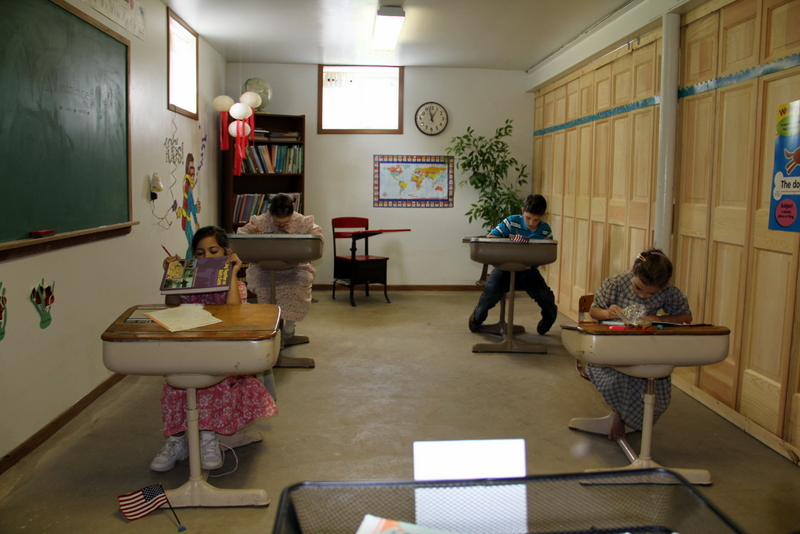
“I’ll call and talk to her,” I say.
But Kaity insists. “I can do it faster,” she says, in the brilliant child reasoning that knows how adults think. So I dial the number and hand the phone to Kaity.
She gets only dial tone.
I set the phone on my desk and get busy giving spelling tests, thinking I will try again later. And then it is 11:30 and time for lunch, and Kaity and her brother still don’t have theirs. I head to the door that separates the school room from the rest of the church basement, wondering what I am going to do. I’ll have to call again, I think. Or maybe drive home, just a quarter mile up the road, and see if I can get a lunch together for the two of them.
I look through the glass panes on the classroom door.
What are all the ladies doing here? And children? And birthday balloons!
“Surprise!” they yell.
And my four students are behind me, grinning, peering through the door.
I wonder why I am so loved.
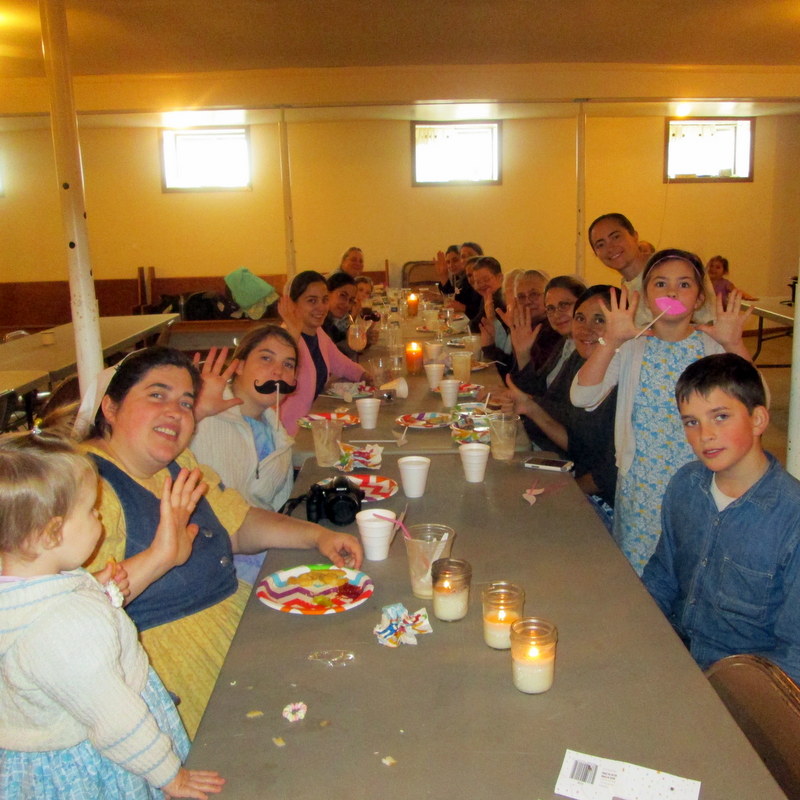
The ladies set out birthday plates, hamburgers, root beer and ice cream, cups and straws–every straw adorned with a paper mustache or a pair of kissy lips.
So this is the reason for Kaity’s missing lunch.
They pile gifts on a table. A Christmas cactus from Joanna. A pot holder from five-year-old Dorcas, woven on a child’s weaving loom. A candle from Grandma. Shiny black poodle bookends from Kathy. A sweater from Dora. Flowers from Regina. A hand crocheted doily from Grace. Fuzzy yarn and wooden knitting needles from Kim.

An apple from my mom. It is a green apple covered in chocolate–a stripe of white, a stripe of butterscotch, a stripe of dark–and set on a pretty red plate garnished with a fall leaf. “I saw it in Better Homes and Gardens,” she says.
We eat lunch. Take pictures with mustaches and lips.
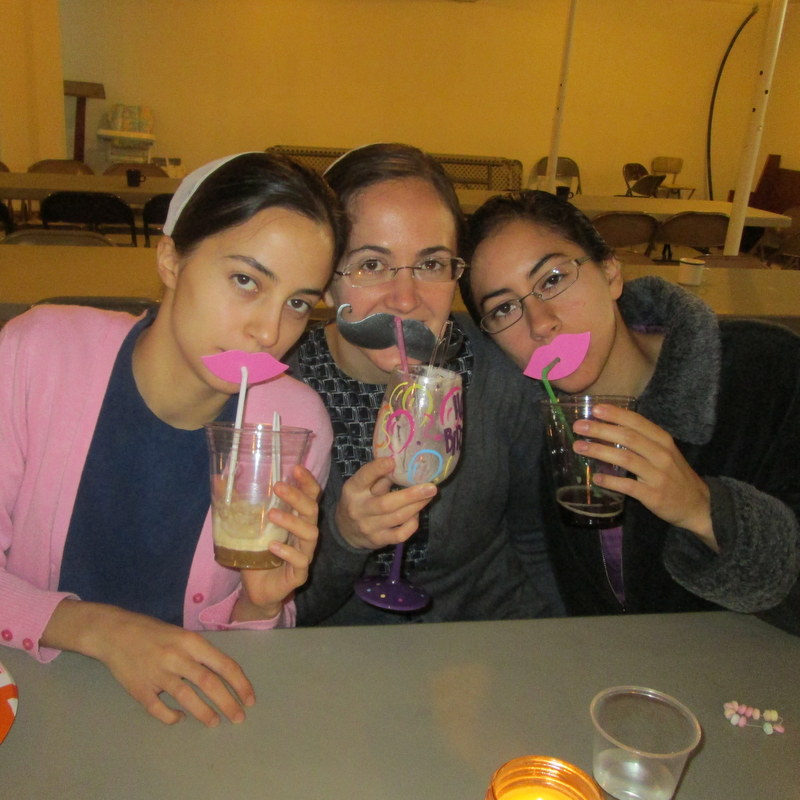
I am honored to be surprised by a party. The rest of the school day goes quickly.
When I get home, Mom is working in the kitchen–making homemade ice cream, making a birthday cake, putting dishes in the dishwasher.
“Liz and I can clean the Jump River Electric tonight,” she says. “You can have a break.”
“No, of course I’ll help,” I say.
We have been cleaning the Jump River Electric offices three evenings a week for years, passing the job between family members. First my two oldest sisters, ages fourteen and sixteen, cleaned the offices. Later I started helping. Then Jennie left to teach school and get married, and my younger sister Kathy helped. Then Dora and I left, and Mom and Liz helped Kathy. Then Kathy got married, and I started helping again. Always a jigsaw, but always someone to do it, three times a week for sixteen years. It is like tying shoes or brushing teeth: so habitual you don’t even hate it, you just do it.
Mom and Liz and I leave to do the cleaning at seven, when finally the birthday cake is baked, the frosting made, the homemade ice cream has ceased its noisy turning in the maker.
I am tired. I have a cold which I caught from Kaity at school.
After the JREC offices, there is still the library to clean.
We started the library cleaning job at the beginning of this year. We clean there three times a week also, but we do it after evening chores, when Dad can help. At first, the whole family worked together–the three boys and Liz and Dad and Mom and I. Then it was fun, and I wandered dazed between books, marveling at the privilege of having an entire library to myself.
Recently, with work intense at the meat processing plant where they work, the boys have stopped helping with the cleaning. They come home after work and go out to help Dad with evening chores, their eyes red from an early morning, and fall asleep afterwards on the couch or the living room floor. So Dad and Mom and Liz and I clean, three nights a week. It doesn’t take us any longer to clean than it did at first, because we have grown more efficient, but the joyous novelty of it has worn away. Now I only think of late nights and of wanting to get home.
Tonight, the night of my birthday, I am resentful and tired. If I just had more time to myself, I think.”Are we going to do this next year?” I ask Mom, as she parks the car in front of the library. Dad is already here, waiting in the van.
“I guess it’s not as relaxed as it was at first, is it?” she says. Her face drops.
“Didn’t any of the boys come to help tonight?” she asks Dad as she unlocks the library door. “I thought maybe they would, tonight.” Her face is tired, and her eyes water a little. I have done this with my words. I think of how she worked all day to make my birthday special, making me a chocolate-covered apple, a cake, and homemade ice cream.
And here I am unwilling and reluctant to help her, hurting her because she thinks I am unhappy. Mom spends her life working for her family, and the only thing that makes her unhappy is to feel that her children are unhappy.
“Well, it sure is nice to get the money, anyway,” I tell her inside. This makes her smile. I hope I can repair damages.
“Getting tired of cleaning here?” Dad asks me, as I empty trashcans downstairs.
“Well–the money sure is nice.”
He smiles, and I think he is relieved. “Yeah, I need the money too.”
At the end of cleaning, we talk–Mom and Dad and Liz and I–me leaning against the librarians’ desk, Dad standing by the bookshelf opposite. The red vacuum sits beside us with its gray cord unwound across the floor, a pile of wadded paper towel on the floor next to the janitors’ closet.
Dad explains what I already know–why he and Mom want to keep this library job. “We need a practical plan for retirement,” he says. “You don’t have to help, but it’s too close to the time when we might sell the cows for Mom and me to quit. This is something we can do to make a steady income when we’re old. I used to think we could retire when we got old, and I’d dream about what we’d do, but now I realize retirement just isn’t in the plans. Some people retire–but the working stiffs like us just have to keep on working.”
“Aren’t you jealous of the ones who retire?” I ask.
He shrugs. “Working is a part of life. It doesn’t hurt us.”
“I don’t think we realize what hard work is,” Mom says. She tells us the story of a young rickshaw driver she read in a book called Global Village, by Gary Miller.
Later, I read the story for myself. The young Bangla father lives away from his family weeks at a time, and during a fourteen-hour day of pedaling, earns $5.70. The dream of his life is to earn enough to buy his own rickshaw and move back home with his wife and two sons.
Another lady, from Cambodia, earns a dollar a day by cutting long-stemmed weeds, stripping them of bark, and, in a day’s time, weaving a basket to sell at market. With this, she supports her family.
No, I suppose I do not know what hard work is.
At home, we shake the boys awake to eat birthday cake and homemade ice cream. They are tired and eat with heads hunched over bowls, not talking. I blow out candles and exclaim over more gifts.
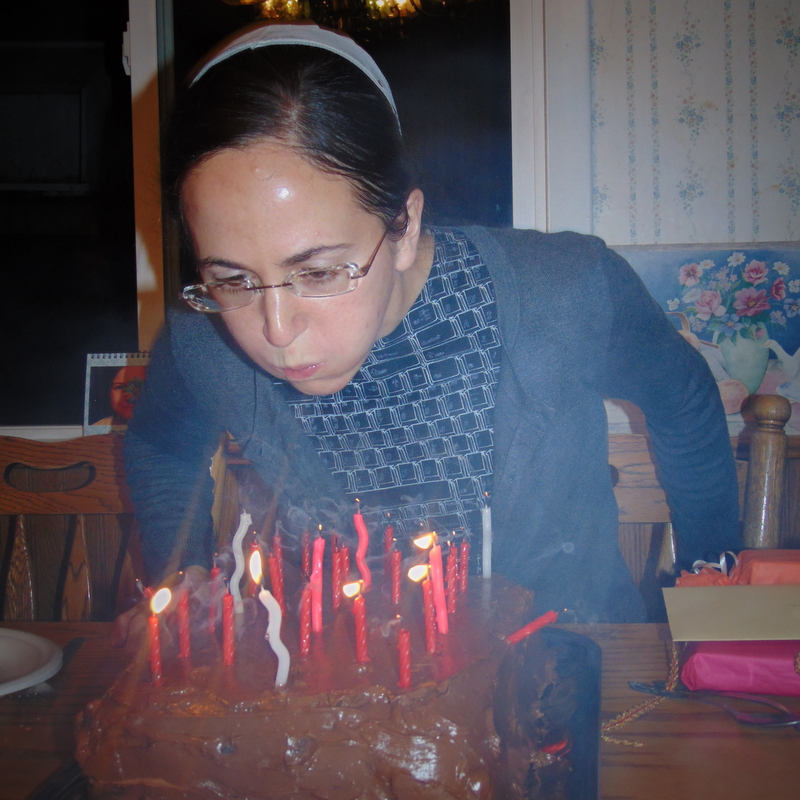
“How many beef did you butcher today?” Mom asks Jeff. Today is Thursday. Kill day at the butcher house, and Jeffrey works on the kill floor.
“Eleven.”
“Wow,” I say.
“And sixteen bison.”
“What!?”
“And eighteen pigs.”
Mom and I are astounded, outraged. “How many guys were working at it?” Mom asks.
“Five,” Jeffrey says.
Five guys, one day–forty-five animals killed and gutted. No wonder they are tired.
“My hands hurt,” Jeffrey says. The boys stalk silently back into the living room or upstairs to their bedroom, drop onto couches and beds.
My brothers work hard–but they have money saved, weekends off, and plans for the future.
In Global Village, Gary Miller writes that if the world were condensed into a village of one hundred people, eighty villagers would earn less than $10 a day.
Only one person–the richest man in the village–would earn more than $34,00 in a year.
As a contrast, to reach the wealthiest one percent in the U.S., a person would have to earn more than $343,000 a year. It is easy to see why I get my perspective crossed, thinking we are poor when really we are rich.
“Good night, love you,” the rest of us tell each other after the boys are gone.
Mom gives me a hug.
I think of a friend of mine, who told me recently that she would not want the U.S. to go backward to women “barefoot, pregnant, and in the kitchen.” She was talking about equal rights for men and women, but I took her words out of context and was a little bit offended.
My mom spent six years of her life pregnant, and at least that many in the kitchen, and her life is not worth less because of it.
Some women might think her life a miserable drudgery: helping her husband with the farm work, bearing children, fixing meals. Others might be jealous because her husband is kind and loves her, because he helps with laundry and making bread, because her three sons respect her and her five daughters come to her for advice.
I know that she is a woman of value.
“Have you ever wanted to be rich?” I ask her, a few days after my birthday. I have been wanting that a lot lately. Life would be easy, if one was rich.
“Oh, yes, I have,” she says. Her eyes sparkle, face refreshed after a Sunday afternoon nap, soft in her pink plaid housecoat. “But probably not for the right reasons. I just wanted to buy more things.”
We talk about the differences between rich and poor. “If you were rich, there would be things you’d have to give up,” Mom says. “It would be hard to keep a simple lifestyle.”
“And I want to be a missionary,” I say. “Where I live here in the U.S., or in a different country, I want to be a missionary.”
“You can’t have everything,” she tells me.
I have just been busy telling her how I’d like to go to college to learn about writing. Mom is uneasy, as she always is when I bring up the subject of college, worried about what college might do to my spiritual life. It is my fault she is worried. I took a creative writing class once before, and never before exposed to a certain godless assurance found in educated thought, it took months afterward for me to sort through all the doubts.
“The educated people,” Mom says now, “–I don’t know–they put God on their own level. I would rather have you go work on the mission field somewhere. I think you’d learn more about life quicker that way, and it would give you things to write about.”
I think about the way the world is divided and know she is right.
Sixteen of the people in a global village of one hundred have no access to safe drinking water. Twenty-five have no access to a cell phone, sixty no access to any kind of toilet, and seventy-three no access to toilet paper. Ninety-one do not own a personal vehicle.
It is here, with the ninety-nine working stiffs, and not with the wealthy one percent, that the real stories of the world lie. Theirs is the drama and the sacrifice, the pain, the brutality, the hope, the tears. If I want to write about the real world, I must write about these.
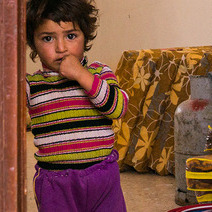
Love reading your posts! This one made me miss ya’ll really really bad!!! You have a special family, and ya’ll are very special to us!
This post brought Sheldon close again! Has it really been 16 years since mom and April were cleaning JREC? And I didn’t realize it was you all who took it over! And cleaning the library! And working the meat job. You guys are the people who help make the world go round in your community. God bless you all. Your mom’s humility and wisdom is such a richness too! God bless you all!
You can be a missionary – you are one – no matter where you live. ‘Trouble is, we think of missions as being somewhere over there in another country where we can see the difference we make readily. We forget that, living here we are also on a mission field. It’s called living life in the trenches. But you already know that. :-)
Amen! to what Amy said. I understand your desire to go to college to learn to write better, but you already have a gift my dear. Also, you are being that missionary right now in the way you live your life. God bless you and hold you during this time of searching. Love to you and your family…
p.s. I loved your mom’s attitude on life while I was growing up there. Her sweet smile was an inspiration to me.
Thanks for another peek into your life!! I miss you guys! (and I’m glad you had a happy birthday!) Keep striving! :)
I love the sweet peeks into your life and family, Luci Goosey. :)
Our dreams and reality, our incredible life of being blessed beyond measure, our constant desire for More and Deeper and Different….
I identify with so much of what you write!
Thank you. I couldn’t have said it better. We are alike in so many ways.